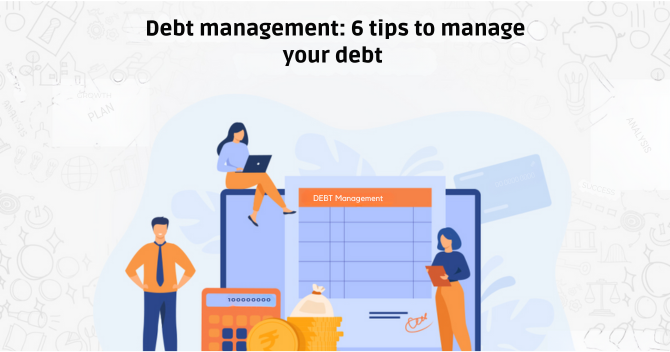People have been seeking for credit in greater numbers over the last couple of years for a variety of reasons. Most of this is typically attributed to an improving economy and an increase in credit card borrowing. Additionally, loan applications are now easier to complete because of online Know Your Customer (KYC), rapid disbursal, straightforward eligibility requirements, digital lending technology, and more.
While this empowers people to fulfil their financial goals more conveniently, having multiple debts can often become difficult to manage. This is where debt management comes in. It is a practice of minimising debts by organising and repaying them in the best way possible. If you are someone who is finding it difficult to manage your outstanding loans and credit card bills, then this article is for you.
Tips to Manage Debt in 2023
Managing debts can seem like a difficult task, but you can simplify it with proper financial planning, budget management, and responsible spending. Here are some debt management tips that you can follow
Be Aware of Your Existing Debts
Keeping track of your repayments is the foundation of a debt management plan. Create a list of the amount you are supposed to pay every month, including the name of all the creditors, and other details. Then prioritise your debts by taking their interest rates and date of repayment into consideration. Ideally, try to repay those with the highest interest rates first. This will enable you to decide if you can and should take on new credit. Just remember, taking a lot of credit negatively affects your credit score.
Pay Your Debts on Time
Missing your monthly payments can make things even more difficult for you. Apart from having to pay the missed amount along with the current month’s payment, you will also have to pay the penalty, which further impacts your credit score negatively. A good solution for this is setting reminders about the repayments or scheduling them to be sent automatically via your bank account.
Put a Budget Together and Stick to It
By preparing a budget for all kinds of expenses and debt payments, you can keep better track of your financial situation and find which expenses you can cut down on. A good practice would be to classify your future financial expenses into long-term and short-term goals and prioritise them as per their requirement and urgency. By sticking to your budget, you can manage your debt well.
Always Pay the Full Outstanding Amount
Paying your debts on time is important, but you should consistently aim to pay the full amount, not just the minimum amount necessary. If your financial situation allows you to repay your debts at once, you can consider this option. Many leading NBFCs let you pay off your debt before the end of the tenure without levying any foreclosure charges, so take advantage of that.
Always keep an Emergency Backup Fund
Having a backup fund in case of an emergency will help you handle emergency financial situations better. You should set aside some funds to meet any sudden expenses. This could be a lump sum amount or a part of your savings that you keep aside monthly.
Consider Debt Consolidation
Consolidating your debts means using the funds from a fresh loan to repay other debts. Some leading NBFCs in India like Credit Success offer Personal Loans for debt consolidation at attractive interest rates. By opting for debt consolidation, you will only have to repay a single loan with better terms.
Conclusion
Debt management is important for maintaining your financial health and managing your expenses better. With debt consolidation, creating a budget, and more, you can reduce your outstanding payments with ease. So, consider following the above-mentioned debt management tips and tackle your debts head-on.
Frequently Asked Questions
What are the techniques of debt management?
Some of the most effective ways to manage debt include analysing your debts, creating a detailed budget of your expenses and income, and prioritising your spending. You should also pay your dues on time, and consider debt consolidation to manage multiple debts with a single loan.
What is the key to managing debt?
Several debt management strategies will help you, but the key to making them work is by being more mindful of your expenses and stick to your budget.
How to get out of debt in 2023?
Here are some techniques that can help you reduce your debt in 2023
- Create a well-thought-out budget.
- Cut down unnecessary expenses to maximise your savings.
- Prioritise paying debts with high-interest rates.
- Check if debt consolidation is a good option for you.
- Find ways to increase your income.
- Become financially literate so you handle your debts better.
What is the principal of a debt?
The principal is the total amount of money that is borrowed from a lending institution. As the borrower, you must repay it in full over time along with the interest. For example, if you have borrowed a loan amount of Rs. 5 Lakh, this Rs. 5 Lakh is the principal amount of your debt.

